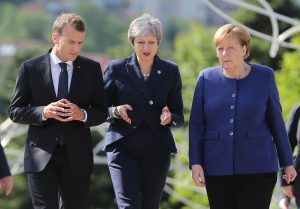By Gabriela Baczynska
SOFIA, May 17 (Reuters) – French President Emmanuel Macron ruled out on Thursday any trade war with the United States over its withdrawal from the Iranian nuclear deal as a wave of European companies quit business with Tehran, fearing the global reach of U.S. sanctions.
European Union leaders united behind the 2015 accord, and Brussels announced it would launch a legal process banning EU-based firms from complying with the sanctions that President Donald Trump has reimposed on Iran.
However, corporations face the choice of trading with the biggest economy in the world, the United States, or with Iran, risking sanctions and massive fines as well as losing access to the dominant U.S. financial system.
Even the European Commission’s financial services chief said that using EU powers to ban banks from following the sanctions that Trump announced on May 8 would be of limited use, given the global reach of finance.
Macron acknowledged the predicament of firms wanting to trade with Iran or invest there, especially multinationals with close business ties to the United States. But he made clear bigger matters were at stake.
“We won’t start a strategic trade war against the U.S. about Iran,” he said on arriving for a second day of a European Union summit in Bulgaria. “We’re not going to take counter-sanctions against U.S. companies, it wouldn’t make sense.”

French energy group Total said on Wednesday it might quit a multi-billion-dollar gas project in Iran unless it secured a waiver from the sanctions. Tehran had repeatedly hailed the project as a symbol of the nuclear accord’s success.
“The French president is not the CEO of Total,” Macron said. “My priority is not trade or finance in Iran. It’s geopolitics, avoiding escalation, doing everything to open up Iran’s economy and society.”
The EU wants to salvage the 2015 nuclear deal between Tehran and world powers, which lifted most of the international sanctions that have badly hurt the Iranian economy in exchange for curbs on its nuclear programme.
But while Europe sees the pact as vital for international security, Trump denounced it as “the worst deal ever” for failing to curb Iran’s separate ballistic missile programme and its influence in Syria, Yemen, Iraq and Lebanon.
EU officials say there is no easy way to protect EU firms and banks from the U.S. sanctions that Trump has reimposed and some big names are already heading for the door.
As Macron spoke in Sofia, the world’s largest container shipping firm, A.P. Moller-Maersk, said it would quit Iran.
BRAVE FACE
Still, EU leaders put on a brave face, sticking by the Iran accord despite their weak hand in defying the will of the country that issues the dollar, the dominant currency of international trade.
“All European Union member states are still backing this agreement, despite the fact the United States has decided not to, and we will continue talks with the United States,” German Chancellor Angela Merkel told reporters at the EU summit.
European Commission President Jean-Claude Juncker said the EU executive would launch on Friday the process of activating a “blocking statute” – legislation banning EU companies from complying with U.S. sanctions on Iran and which does not recognize any court rulings that enforce American penalties.
But the EU will have to swim against a strong tide. Soren Skou, chief executive of Danish-based A.P. Moller-Maersk, said his firm would have to accept the sanctions.
“With the sanctions the Americans are to impose, you can’t do business in Iran if you also have business in the U.S., and we have that on a large scale,” Skou told Reuters. “I don’t know the exact timing details, but I am certain that we’re also going to shut down.”
[aesop_image img=”https://kayhanlife.com/wp-content/uploads/2018/05/download-2-9.jpg” panorama=”off” align=”center” lightbox=”on” caption=”FILE PHOTO: A Maersk tanker sails, December 12, 2012. Picture taken December 12, 2012. Ritzau Scanpix/Asger Ladefoged/via REUTERS
” captionposition=”left” revealfx=”off” overlay_revealfx=”off”]
Europe’s “blocking statute” has never been used until now and its rules are vague and difficult to enforce.
“The EU blocking regulation could be of limited effectiveness there, given the international nature of banking system and especially the exposure of large systemic banks to U.S. financial system and U.S. dollar transactions,” financial services commissioner Valdis Dombrovskis told the European Parliament.
Italian steel manufacturer Danieli announced it has halted work on finding financial coverage for orders it won in Iran worth 1.5 billion euros ($1.8 billion).
“With the withdrawal of the U.S. from the treaty the banks are no longer ready to fund Iranian projects for fear of secondary sanctions,” Danieli CEO Alessandro Trivillin said.
Finnish mining technology company Outotec said U.S. sanctions would slow down and complicate its ties with Iran but it was too early to say if it would leave.
Iranian President Hassan Rouhani has said Tehran would remain committed to the deal, which China, Russia, Britain, France and Germany also signed, provided those powers ensured Iran was protected from sanctions.
(Additional reporting by John Irish, Huw Jones, Ivana Sekularac, Alastair Macdonald, Paul Carrel, Stine Jacobsen and Jacob Gronholt-Pedersen; writing by David Stamp; Editing by Richard Balmforth)

